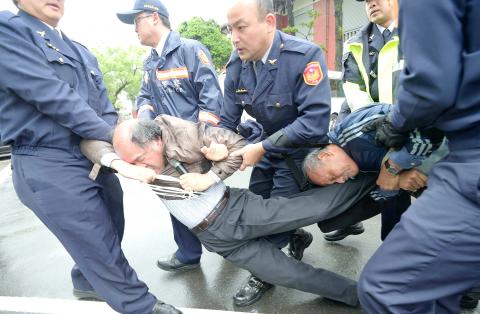While the government has consented to China’s inauguration of a new commercial flight route near the middle of the Taiwan Strait starting tomorrow, opponents continued to rail against the plan yesterday, leading to the adjournment of a regular legislative session.
Legislative Speaker Wang Jin-pyng (王金平) at about noon declared the question-and-answer session with Premier Mao Chi-kuo (毛治國) adjourned until Tuesday, following hours of fruitless talks among party caucuses on the demands made by the Taiwan Solidarity Union (TSU).
The TSU demanded that the implementation of the M503 route be put off until information regarding the negotiations about the route between Taiwan and China that took place earlier this month is deliberated and approved by the legislature, TSU Legislator Lai Cheng-chang (賴振昌) said.

Photo: Sam Yeh, AFP
Should China insist that it will start using the route, the government should indefinitely suspend any further negotiations with China because the move would be tantamount to infringement into Taiwan’s airspace, Lai said.
Cross-strait talks are scheduled to be held on Tuesday in Beijing, the 10th round of talks to conclude a trade in goods agreement.
The government recently gave its consent to the proposed route after Beijing agreed to revise its original plan, announced in January, by moving the route westward by 6 nautical miles (11km) and delaying the adoption of three feeder routes: W121, W122 and W123.
However, many in Taiwan remain concerned about the security risks, as the route still comes as close as 10.2 nautical miles to the median line of the Taiwan Strait.
In addition to the government saying it understands that the congestion of China’s A470 route warrants the opening of a new route, National Security Bureau Director-General Lee Shying-jow (李翔宙) on Thursday said that the implementation of the M503 route would force China’s military jets to patrol farther from Taiwan and thus give Taiwan more leeway on defense.
Lee’s argument and that of Chinese Ministry of National Defense official Geng Yansheng (耿雁生), who on Thursday described the route as an “air passage of peace,” suggested that Beijing did not designate the M503 unilaterally, but in collusion with President Ma Ying-jeou’s (馬英九) administration, Democratic Progressive Party Legislator Huang Wei-cher (黃偉哲) said yesterday.
When TSU lawmakers occupied the podium to boycott the session, dozens of activists broke into the legislative compound in a surprise protest against the government’s handling of the issue, but they were stopped outside the building as security guards quickly pulled down a steel door.
The protesters shouted: “Abolish M503” and other slogans denouncing the government’s concessions as a “forfeiture of the nation’s sovereignty.”
They were forcibly removed from the legislative complex by police.
Activists staged a similar protest on Thursday at the offices of the Mainland Affairs Council.

CHAOS: Iranians took to the streets playing celebratory music after reports of Khamenei’s death on Saturday, while mourners also gathered in Tehran yesterday Iranian Supreme Leader Ayatollah Ali Khamenei was killed in a major attack on Iran launched by Israel and the US, throwing the future of the Islamic republic into doubt and raising the risk of regional instability. Iranian state television and the state-run IRNA news agency announced the 86-year-old’s death early yesterday. US President Donald Trump said it gave Iranians their “greatest chance” to “take back” their country. The announcements came after a joint US and Israeli aerial bombardment that targeted Iranian military and governmental sites. Trump said the “heavy and pinpoint bombing” would continue through the week or as long

TRUST: The KMT said it respected the US’ timing and considerations, and hoped it would continue to honor its commitments to helping Taiwan bolster its defenses and deterrence US President Donald Trump is delaying a multibillion-dollar arms sale to Taiwan to ensure his visit to Beijing is successful, a New York Times report said. The weapons sales package has stalled in the US Department of State, the report said, citing US officials it did not identify. The White House has told agencies not to push forward ahead of Trump’s meeting with Chinese President Xi Jinping (習近平), it said. The two last month held a phone call to discuss trade and geopolitical flashpoints ahead of the summit. Xi raised the Taiwan issue and urged the US to handle arms sales to

State-run CPC Corp, Taiwan (CPC, 台灣中油) yesterday said that it had confirmed on Saturday night with its liquefied natural gas (LNG) and crude oil suppliers that shipments are proceeding as scheduled and that domestic supplies remain unaffected. The CPC yesterday announced the gasoline and diesel prices will rise by NT$0.2 and NT$0.4 per liter, respectively, starting Monday, citing Middle East tensions and blizzards in the eastern United States. CPC also iterated it has been reducing the proportion of crude oil imports from the Middle East and diversifying its supply sources in the past few years in response to geopolitical risks, expanding

OTHER OPTIONS: Given possible US intervention and Taiwanese counterattacks, China might opt to blockade Taiwan or take its outlying islands instead of an all-out invasion A US think tank has urged Taiwan to adopt a “hellscape” strategy that would flood the Taiwan Strait with drones and other uncrewed systems to deter invasion by China. In its report, Hellscape for Taiwan, published on Thursday, the Center for a New American Security said Taipei’s asymmetric defense approach — often described as a “porcupine strategy” — needs to evolve to keep pace with the growing capabilities of the Chinese People’s Liberation Army. The “hellscape” strategy involves saturating the air and waters around Taiwan with thousands of drones and other platforms capable of striking invading forces from multiple domains at once. Long-range